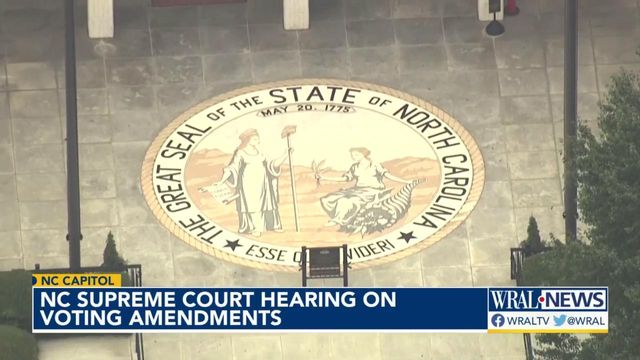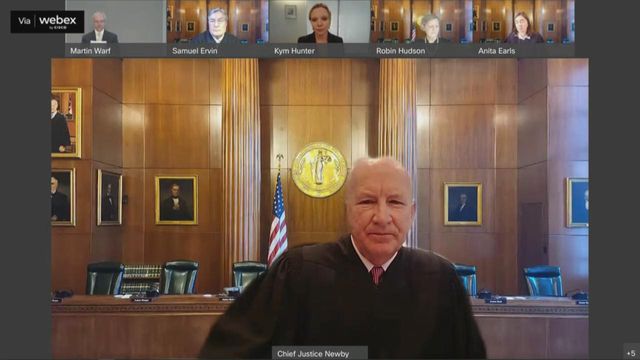NC Supreme Court hears voter ID law challenge
The North Carolina NAACP argues Republican lawmakers should not have been allowed to initiate a process that resulted in voters supporting a constitutional amendment requiring photo ID at the polls.
Posted — UpdatedThe North Carolina Supreme Court heard arguments Monday in a case that could ultimately throw out the state’s voter ID law and help answer a question about legislative power: If a general assembly is elected through illegally gerrymandered maps, should it lose any of its power to change state law?
The state NAACP argues that, at least when it comes racial gerrymanders and a pair of 2018 constitutional amendments, the answer is yes. The group’s legal team wants the state’s high court to throw out one constitutional amendment requiring photo ID at the polls and another lowering the cap on the state income tax rate, saying those amendments exist because of a Republican super majority that wouldn’t have existed but for gerrymandered maps.
Voters approved four of those amendments. The lawsuit argues that an illegally elected legislature shouldn’t be able to start the amendment process. It doesn’t target other laws passed the legislature—laws that can be passed with a simple majority and the governor’s signature—although at least one Republican justice expressed concern during Monday’s arguments that the argument may later be used to do so.
Kym Hunter, a lawyer who represents the NAACP in the case, said Monday that constitutional amendments are much harder to undo than laws, requiring another three-fifths vote and another voter referendum. Because of that, the court should be more protective of the process, Hunter said. She said the court has the power to "forestall" the potential chaos of invalidating dozens of laws by limiting its ruling in this case.
"The court, as it always does, has to look for a manageable standard," Hunter said. "Where is it most important that the court step in and protect our constitutional democracy?"
Justice Phil Berger Jr.—whose father, Republican Senate leader Phil Berger, a defendant in the case—had presented a hypothetical: Suppose a legislature, later found to be elected under unconstitutional maps, passed new domestic violence laws. Wouldn’t lawyers, the Republican justice asked, argue that their clients couldn’t be prosecuted under those laws?
“I’m trying to figure out where the law goes if we make your decision,” Berger said.
Hunter said the court could make clear in its opinion that it’s only dealing with constitutional amendments. The NAACP’s case is narrowly tailored, only asking the court to undo constitutional amendments approved after the racial gerrymander was declared. The case targets just two amendments instead of the four that passed in 2018 because those are the two the NAACP had standing to challenge, Hunter said. Among other things, the group argues these two amendments would disproportionately affect communities of color.
Chief Justice Paul Newby said the “will of the people” on those amendments seemed to be expressed during the referendum. Both passed easily and voters, the Republican chief justice said, provide "the ultimate check” on legislative power.
“Why should we discount, or undervalue, the vote of the people?” Newby asked.
We shouldn’t, Hunter responded. “Nor should we undervalue that important first step,” legislative approval, she said.
Democrats hold a 4-3 majority on the state Supreme Court, and the partisan gerrymandering decision broke along party lines. Two Democratic seats are up in this election cycle, though, opening the possibility that the majority will shift as soon as next year.
Justice Robin Hudson, one of the high court's Democrats, pressed Monday for potential remedies in the NAACP’s case. If the court cannot invalidate an illegally elected legislature's actions, she asked the lawyer for GOP lawmakers, what check is there on their power?
Martin Warf, who represents legislative leaders in the case, echoed the argument Newby had advanced, saying voters are "the ultimate check on the authority of all branches of government.”
Warf said the General Assembly that began the amendments process “never lost its authority to act” and that what the NAACP is asking for in this case would be “unprecedented and wrong.”
“In no case has a court enjoined a legislature from acting,” Warf said.
Justice Anita Earls, a Democrat who repeatedly sued the General Assembly in election cases before her election to the high court, said no court has been faced with this situation, though. Earls also harkened back to Hunter’s argument: Just because voters must approve amendments doesn’t mean the first step can be ignored.
• Credits
Copyright 2024 by Capitol Broadcasting Company. All rights reserved. This material may not be published, broadcast, rewritten or redistributed.






